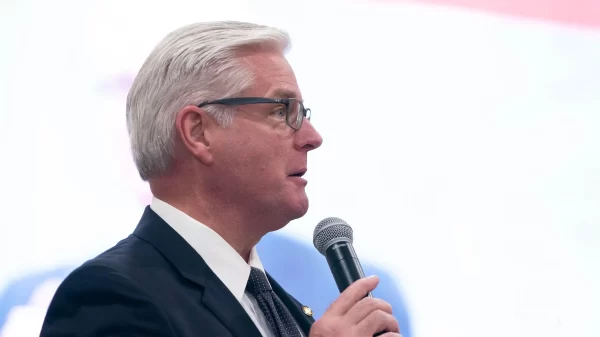By Chip Brownlee
Alabama Political Reporter
MONTGOMERY — A toned-down version of the bill authorizing the construction of several new prisons with a bond issue is expected to go before the Senate Judiciary Committee on Thursday, the bill’s sponsor said.
The new plan, shepherded by Sen. Cam Ward (R-Alabaster) who has been the bill’s sponsor in the Senate, would reduce the number of new prisons from four to three.
The original plan included three 4,000-bed men’s prisons and a smaller women’s prison at a maximum price of $800 million, which would have been financed through a bond issue.
In the plan to be introduced Thursday, the proposed women’s prison would be cut out and replaced with additional appropriations for renovations and refurbishment at the existing Julia Tutwiler Prison for Women. Those renovations would be financed through a bond issue authorized by the bill.
“There was really no savings with doing a new women’s prison,” Ward said. “What we were closing down would not generate enough in savings to do another.”
The total cost of the new plan, which will go before the Judiciary Committee on Thursday for a vote, is a maximum of $775 million. Each new men’s prison would cost between $200 million and $225 million, Ward said. The new prisons would take up about $650 million of the total bond issue under the plan.
The remaining $125 million would go to finishing up existing maintenance and repair plans at Tutwiler and new renovations at the other remaining prisons the Alabama Department of Corrections chooses to keep open.
“We still feel like there is a little bit more modernization that needs to be done in regards to electrical and security at Tutwiler,” Ward said.
The compromise plan also reverts the bidding process to the tradition design-bid-build system, instead of the contentious design-build plan included in the original iterations of the plan.
Several legislators have criticized the design-build process because it cuts out several additional layers of bidding transparency, they said.
Using the tradition bid process, which includes bidding an architect and a contractor, instead of the design-build process, which would bid a firm to do both design and construction, may cause the project to take longer and cost more money.
But Ward thinks the compromise could work out better in the end.
“Although I still feel like design-build would have worked fine, I think there is so much concern and skepticism about State government today that going back to the way we’ve always done it would be good,” Ward said. “Going back to the method that we’ve always used made people feel a lot better.”
The new compromise would allow municipalities or counties to create a “cooperative district” to take out their own bond issue and build new prisons that could then be leased back to ADOC for State use. The change was designed to alleviate tension among some legislators, like Sen. Billy Beasley, D-Clayton, who feared the loss of local prisons in their districts.
For each new prison built locally, a State prison would be cut out of the larger plan.
Sen. Greg Albritton (R-Bay Minette) who represents Escambia County where Holman Correction Facility is, and Sen. Clyde Chambliss (R-Prattville) who represents Elmore County, asked for the local option.
The locally built prisons would have to meet ADOC standards and State bid laws. The localities would also have to establish a public corporation to issue the bond, which would then have to comply with open meetings laws.
“You can only do three grand total statewide,” Ward said. “If DOC says, yep, you can it meeting our stands, then what happens is we don’t spend the money for that one. We just lease it back. That’s less bond money on the State.”
All three of the prisons could possibly be bid and built by localities, saving the State millions in bond debt and allowing localities to compete for new prisons in their area. Ward said he believed at least one county, possibly Elmore County, would exercise that local option.
“The advantage for the State is that it’s less bond money,” Ward said. “The advantage for them is that they get a prison in their community.”
The statewide Legislative Council, a standing bipartisan committee composed of 12 members of both the House and the Senate, would have to sign off on all procedures used by that authority.
The original plan was dubbed the Alabama Prison Transformation Initiative, but that name seems to be dropped in the substitute proposal. ADOC Commissioner Jeff Dunn and Gov. Robert Bentley originally proposed the plan to alleviate overcrowding and understaffing problems in the State’s prisons.
The plan was Bentley’s top priority during this legislative session.
Though the plan was an attempt to address overcrowding and systemic understaffing problems, it doesn’t completely alleviate them. The plan would only reduce overcrowding from about 200 percent capacity to a little more than 125 percent capacity over the next five years.
Alabama’s prisons currently house about 23,000 inmates in a system built mostly in the 1970s for a max of 13,000 inmates, according to the most recent ADOC statistical reports. Bentley’s plan would only increase capacity by 16,000 inmates if the planned number of existing prisons are closed.
The population has decreased from about 27,000 after the Legislature passed sentencing reform measures in 2013. Ward has said he favors an “all of the above” approach, which could include more sentencing reform.
“You’ll never be able to build your way out,” Ward said. “What this does do, combined with sentencing reform, is it gets you to the 137 percent capacity. That would be the steepest decline without endangering public safety of anybody in the country.”
The Federal Judiciary has shown increasing impatience with Alabama’s prison system. In 2014, conditions at Tutwiler Prison were so bad that a Federal court ruled them unconstitutional and ordered improvements.
And another class-action lawsuit filed by the Southern Poverty Law Center over mental health conditions at Alabama’s prisons went to trial in December.
“This by itself is not going to solve all of the problems,” Ward said. “I think we’re going to have to hire more mental health staff. The judge is going to make us. That’s coming. It’s been a mess, a long time coming.”
ADOC has said the consolidation using the “mega prisons” would reduce staffing costs by about $17 million a year, overtime payments by $21 million a year and healthcare delivery by $10 million, according to the two independent studies the department commissioned.
The plan calls for 14 of Alabama’s 17 aging prisons to be closed and consolidated into the three new men’s prisons. Ward said the plan is needed because the State cannot keep patching old wounds.
“All we’ve been doing is bandaging to hold us over for a couple more years, and a couple more years,” Ward said. “It’s causing a huge waste of taxpayer dollars putting Band-aids on facilities that were built in the 1950s.”
The new plan is included in a 50-page substitute that will be proposed in the Judiciary Committee Thursday. The plan is still fluid because members may offer amendments that the Committee could vote on Thursday.
“I think that after all of the negotiations we have a better product today than we had before,” Ward said.
Email Chip Brownlee at cbrownlee@alreporter.com or follow him on Twitter.




















































